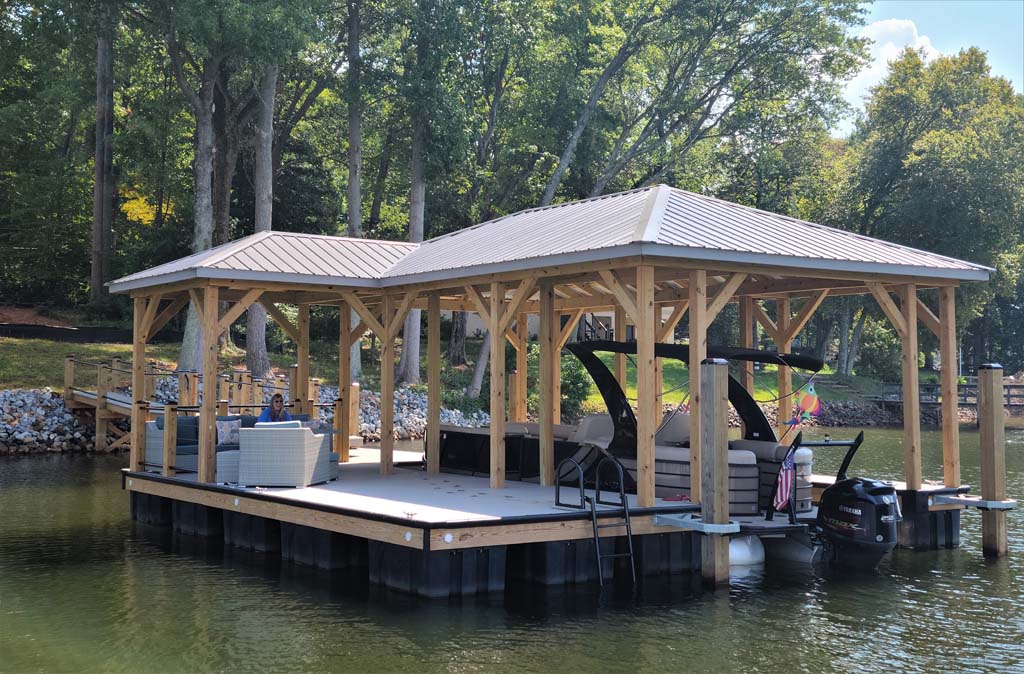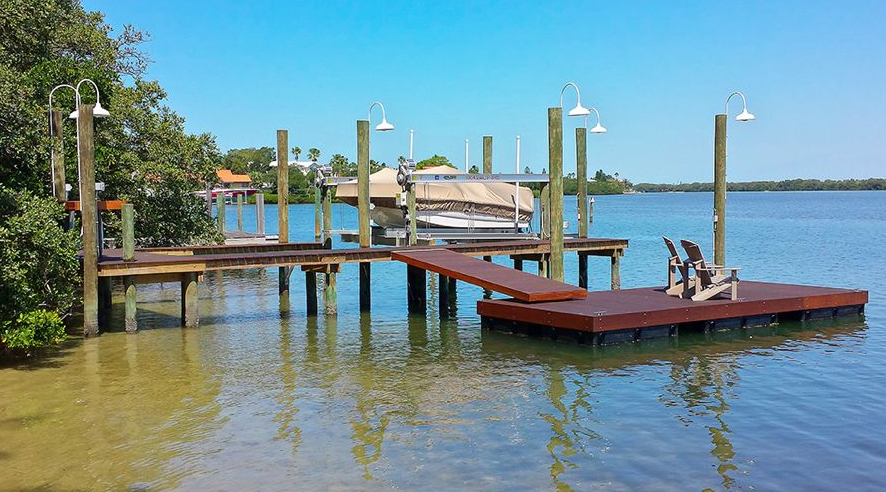Crafting Custom Solutions: Why a Floating Dock Builder is Important for Unique Demands
Floating Docks: The Perfect Choice for Versatile Water Gain Access To
Floating docks existing an engaging remedy for a range of water accessibility requires, supplying adaptability that transcends standard mooring choices. The modular nature of floating docks facilitates customization, catering to certain demands.
Benefits of Floating Docks
Floating docks deal various benefits that improve water access for different applications. Their capacity to drop and increase with changing water levels makes them specifically helpful in atmospheres with rising and fall trends or seasonal variations. This adaptability makes certain that vessels can quickly anchor without concern for the water's depth, offering a dependable platform for leisure, industrial, and commercial uses.
Additionally, floating docks are usually built from resilient materials that withstand deterioration, making them suitable for long-lasting use in aquatic settings. Their installation is usually much less invasive than traditional set docks, lowering the ecological influence and facilitating quicker deployment (floating dock services). This versatility permits for much easier moving or reconfiguration according to individual requirements or environmental modifications
Safety and security is one more vital benefit; floating docks can provide steady accessibility for individuals boarding or getting off from watercrafts and minimize the threat of crashes linked with unpredictable surfaces. Furthermore, they can be developed to fit a variety of devices, such as cleats and fenders, boosting functionality. In general, floating docks stand for a reliable remedy for improving water gain access to across diverse industries while advertising safety and security and environmental sustainability.

Kinds Of Floating Docks
Various kinds of floating docks cater to different demands and environments, each made with certain features to maximize performance. One of the most common types include modular docks, which are composed of interlocking sections that enable easy personalization and development. These docks are perfect for recreational usage, as they can be customized to fit various boat sizes and water conditions.
One more prominent choice is the stationary floating dock, which continues to be anchored in position but drifts with transforming water degrees. floating dock company. This kind is especially suited for locations with marginal tidal variations, supplying steady access for angling or swimming. In addition, there are drive-on docks, which feature a sloped layout that allows watercrafts to easily drive on and off, making them suitable for individual boat and smaller vessels
For commercial applications, sturdy floating docks are available, built from strengthened products to hold up against significant tons and severe aquatic atmospheres. Environment-friendly floating docks make use of lasting products and layouts to minimize environmental influence, frequently integrating features like plants to sustain neighborhood wild animals. Comprehending the various sorts of floating docks makes certain that customers can choose the most appropriate remedy for their particular needs.
Installation Refine Overview
A successful setup of floating docks calls for careful planning and attention to information to ensure optimum efficiency and safety and security. The preliminary action involves examining the site conditions, including water deepness, present, and potential barriers. This evaluation educates the selection of the proper dock materials and layout tailored to the particular environment.
Next, getting essential licenses is important, as several jurisdictions have policies relating to building on water bodies. As soon as authorizations are protected, the installment can proceed. Begin by preparing the structure, which might involve anchoring systems or pilings tailored to the dock type and local conditions.
Following the structure arrangement, put together the dock sections according to producer specs. Make sure that all components are firmly secured and straightened to endure environmental anxieties. Placement the dock in the assigned location, guaranteeing it is degree and stable.

Upkeep Tips and Finest Practices
After the setup procedure is complete, recurring upkeep plays an important duty in guaranteeing the long life and performance of floating docks. Regular examinations should be carried out to recognize any indications of degeneration, wear, or damages - floating look at this now dock company. Inspect for any Click This Link type of loosened installations, cracks, or splitting up in the dock areas, as these can jeopardize structural honesty
Cleansing the dock is necessary to remove particles, algae, and various other build-up that can impact its appearance and safety. Utilize a gentle pressure laundry occasionally to preserve tidiness without creating damages to the surface. In addition, applying a safety sealant every couple of years can assist enhance longevity and withstand environmental wear.
Take notice of the mooring lines and supports, ensuring they are free and safe and secure from rust. Replace any type of abject elements immediately to avoid hazards. Seasonal adjustments may likewise be necessary; during severe weather, repositioning or strengthening the dock can avoid damages.
Applications for Floating Docks
Floating docks offer a plethora of applications, satisfying both leisure and business demands. In recreational setups, they offer smooth access to rivers for activities such as boating, fishing, and swimming. Their flexible nature enables for installment in varying water degrees, making certain secure and safe accessibility despite tidal changes.
Commercially, floating docks are indispensable for marinas and waterfront businesses. They facilitate the docking of vessels, making it possible for reliable dumping and filling of items. Their modular layout permits for simple development or reconfiguration to accommodate transforming service needs, making them perfect for watercraft services, scenic tour operations, or fishing charters.
Furthermore, floating docks are made use of in environmental applications such as aquatic research and environment restoration. They can work as systems for clinical research studies, keeping track of water quality, or conducting wild animals surveys without disturbing delicate communities.
In industrial contexts, floating docks are utilized in building projects, giving access to hard-to-reach areas for equipment and personnel. Their adaptability, longevity, and marginal influence on the environment make them an optimum option for a variety of applications, enhancing both capability and access in numerous water-based settings.
Conclusion
In verdict, floating docks stand for an optimum solution for varied water gain access to needs, owing to their adaptability, sturdiness, and modular layout. Floating docks serve as a useful property for leisure, his response business, and ecological projects, guaranteeing reliable accessibility to waterways and promoting lasting methods in marine environments.
Floating docks present an engaging service for a selection of water accessibility requires, supplying convenience that transcends traditional mooring options.Floating docks deal many benefits that improve water access for numerous applications. Generally, floating docks represent an efficient remedy for enhancing water access across varied fields while promoting safety and environmental sustainability.
One more popular option is the fixed floating dock, which stays anchored in place however floats with altering water levels.In verdict, floating docks represent an optimal remedy for varied water access needs, owing to their versatility, toughness, and modular design.